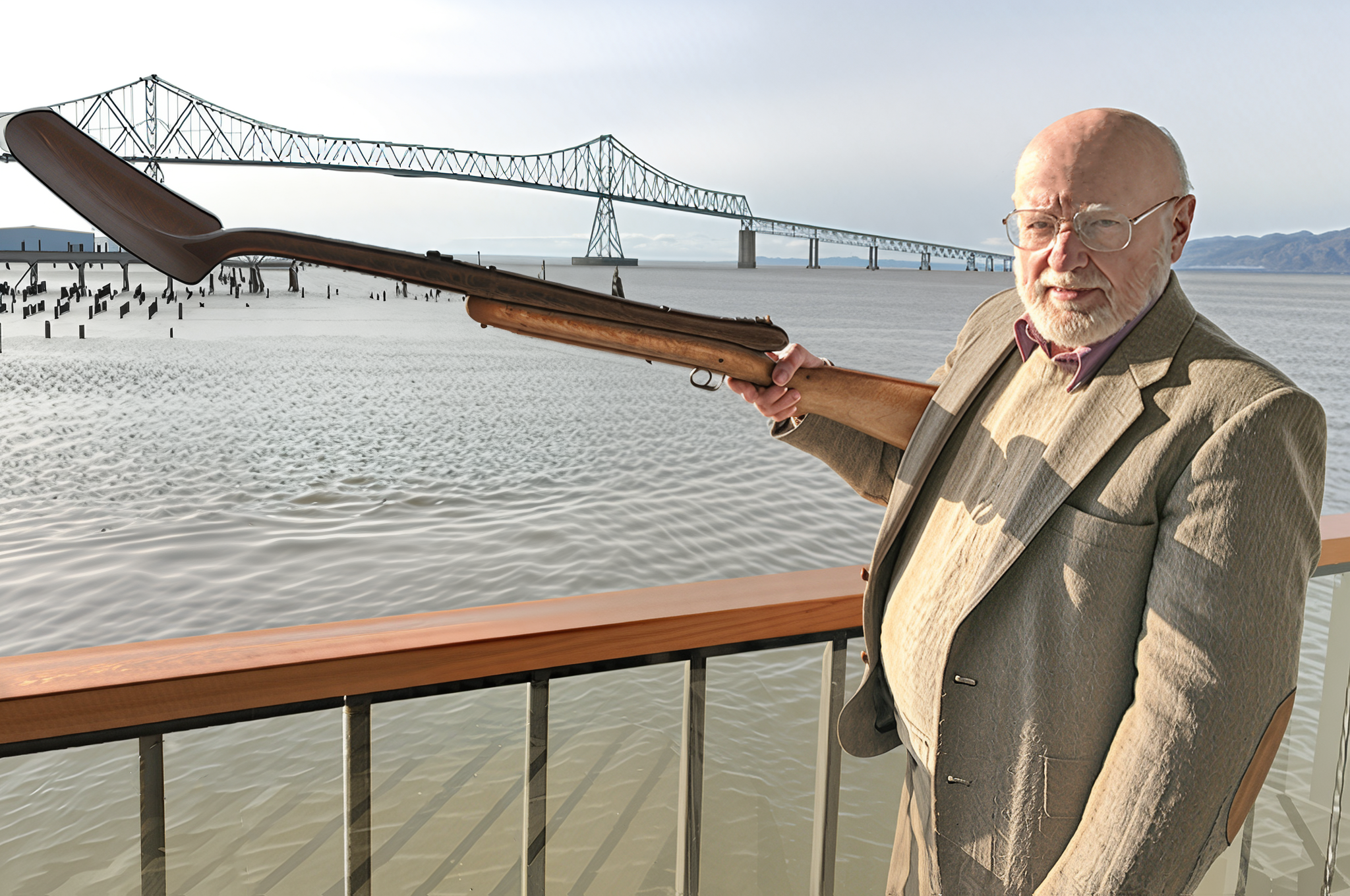In Warrenton, family and friends grieve a virus death
Published 10:30 am Monday, August 30, 2021

- A sign made for Ted Stallsworth at a memorial service near Coffenbury Lake.
A memorial service for a Warrenton man who died from the coronavirus drew nearly 200 people to a picnic area near Coffenbury Lake on Thursday evening.
It was overwhelming to a family who never expected so many people would attend, but, for Ted Stallsworth’s wife, Julie, ultimately heartwarming.
The faces in the crowd — longtime friends, law enforcement, people Stallsworth knew from recovery, clients from his carpet-cleaning business — were a testament to the kind of man he had been, she said. An anchor for her and their four children, a man ready to befriend anyone.
Stallsworth, 52, died on Aug. 19 after being hospitalized since late July. His family believes he is Clatsop County’s 12th virus death based on information reported by the state.
His family doesn’t know how he caught the virus. Around the time he got sick, other family members were also sick. His youngest daughter was exposed through her work. His oldest son was exposed while on vacation. He ended up hospitalized with severe symptoms around the same time as his father. At Stallsworth’s memorial service near the lake at Fort Stevens State Park, he stood up to talk with an oxygen tank in tow.
The virus that killed Stallsworth has killed more than 600,000 people in the United States to date — 13 in Clatsop County as of early Monday. The virus is surging again in Oregon because of the delta variant, placing a strain on the health care system as hospital and intensive care unit beds are becoming scarce.
The Oregon Health Authority reported 58 new virus cases for the county over the weekend. Since the pandemic began, the county has recorded 1,851 virus cases.
Hospitalization rates are expected to continue to rise over the next week, according to researchers with Oregon Health & Science University. Most of the recent hospitalizations and deaths from the virus are occurring among people who are unvaccinated.
Stallsworth was unvaccinated.
‘He said he’d never thought it would get him’
He was not against vaccinations, in general, Julie Stallsworth said, but he told her he felt the vaccines for COVID-19 had been developed more quickly than he was comfortable with. When she got vaccinated in April, he didn’t join her.
Julie Stallsworth isn’t sure the U.S. Food and Drug Administration’s approval of the Pfizer vaccine — the first such approval for a coronavirus vaccine outside of emergency authorizations — would have swayed him. More, it seemed he didn’t think the virus would affect him.
His youngest daughter, Sierra Hodges, didn’t learn he was unvaccinated until after he was hospitalized.
She asked him why.
“He said he’d never thought it would get him,” she said.
Mother and daughter say they have to resist playing “what if” scenarios now — for their own sakes — as they figure out how to grieve.
Still, Hodges said, “I’m almost hurt, like why wouldn’t you take that opportunity to help yourself? I can’t help but think if he’d gotten (the vaccine), he wouldn’t be dead. … If he’d gotten it, maybe he could be here with us.”
She hopes people who hear about her father will take the pandemic seriously. She took it seriously from the beginning, she said, wearing masks before they were required, but she knows others did not.
“Take care of yourself,” she said. “When they say quarantine, quarantine. Get vaccinated if you can. Just don’t let this get too far. Watch your symptoms and get help if you need it.”
“I don’t want anyone else to suffer through this,” she added. “It’s an ugly thing, a painful and ugly thing.”
Julie Stallsworth said she knows of more than a dozen people who decided to get vaccinated after learning of her husband’s death and hearing what the family had endured.
One of Stallsworth’s doctors in Portland urged Julie: You have to keep telling that story.
It’s not a role she really wants to play.
“But,” she said, “if people want to talk to me about Ted, I’ll talk all day about Ted.”
‘He understood that we were better together than on our own and isolated’
Raised in Medford, Stallsworth had a difficult childhood and struggled with drug and alcohol addictions as an adult. He got clean in the mid-1990s and settled in Seaside and, later, Warrenton.
He started Pro-Fresh Carpet Care and, with Julie, raised four children. He served as a reserve officer with the Warrenton Police Department for seven years. He loved to fish and hunt. He rarely took a break. Personal space was for other people, family and friends say. He’d talk and talk and talk, but he’d also listen.
“He understood that we were better together than on our own and isolated,” said Jerry Gaidos, a police chaplain.
Warrenton Police Chief Mathew Workman called Stallsworth “extremely dedicated.”
Stallsworth put in “hundreds of hours on patrol and at community events and was very respected by his fellow officers,” the police chief said.
Stallsworth had joined the U.S. Army at 17 years old and was honorably discharged three years later. He met Julie when they both worked at the same restaurant in Medford. She refused to date him at first because of his drug and alcohol addictions. He told her he’d change for her. The two eventually dated and had a child together, Ted’s second child, a son named Jacob. But Ted didn’t change, so Julie and Jacob left.
They reconnected several years later when Stallsworth was sober and ready to make a different kind of life for himself and his children. Besides Jacob, he had another son, Brandon, and two daughters, Ariel Barber and Hodges.
For the rest of his life, Stallsworth would seek out support from other recovering addicts and alcoholics and offer help in return.
With help from a former girlfriend, Stallsworth started the carpet-cleaning business. He worked a variety of jobs in addition to running the business. Some days, he would sleep for only a few hours between jobs. At 52, he was only just beginning to slow down.
When Hodges heard her dad was sick, she was worried, but she thought about how a high percentage of virus patients with mild cases get better after 10 days. If anyone needed to take 10 days off and relax, it was her dad, she thought.
But Stallsworth’s condition worsened. He was hospitalized at Columbia Memorial Hospital in Astoria and then had to be flown to Portland for care, according to family members. He was on a ventilator and other life-sustaining measures.
Goodbye
On Aug. 16, one of Stallsworth’s doctors called Julie. You need to bring your family together, the doctor told her. Ted wasn’t likely to last the week.
On Aug. 19, the family prepared to say goodbye. Under visitor policies at Legacy Emanuel Medical Center, only two people at a time could go into Stallsworth’s room. Hodges knew she wanted to be there when the machines were turned off. Through her work as a caregiver, she has been with several people when they died, so she knew she would be able to handle it.
She also knew if she left her father’s hospital room and he was still breathing, his heart still beating, her brain might accept his death, she said, but “my heart would have told me he was still alive.”
Stallsworth’s room looked like any standard hospital room. There was a bed and a bunch of machines. Hodges hadn’t seen her father in three weeks and she wasn’t prepared for what he looked like. He had been heavily sedated for a long time. He was pale, bloated. His muscle mass was gone. He was covered in tubes and wires, difficult to reach, especially for someone short like Julie. Looking at him, Hodges realized her mom wouldn’t be able to kiss him while he was still alive.
She went into “nurse mode” — a reaction to her fear, she says now. She asked the nurses to adjust Stallsworth’s bed, lower the railing on one side, move some of the wiring and cords.
When they turned off the respiratory machines, Hodges watched the heart monitor with the nurse. She saw the little bumps marking Ted’s heart beat become smaller and smaller — the heart beat getting flatter and flatter — until there was only a flat line. It had barely been two minutes.
She laid her head on her dad’s chest.
Stallsworth’s mother killed herself when Ted’s third child was very young, but Barber said her death marked him for the rest of his life. He couldn’t seem to accept it.
“He carried it right on his chest,” Barber said.
There was a lot of anger — anger she feels she’s inherited from him along with, she hopes, his charisma, his sense of humor, his genuine desire to help everyone, anyone. She never felt so safe as when she lived in her father’s house.
At Stallsworth’s memorial service, Brandon Stallsworth said it wasn’t until he was a teenager that he began to understand all the things his father was trying to overcome. Stallsworth, Brandon realized, was actively learning how to be a husband and a father, how to be a good man.
Stallsworth never did hard drugs again, but over the years, he still slid back into alcohol at times. It wasn’t always easy in the Stallsworth household. Ted’s anger could bubble up; he’d lash out verbally.
He got sober again in 2019. This time, it seemed like it was for good.
That sobriety comforts Hodges now. Her dad died, but he died sober. He achieved what he had pushed for and against for so long.









